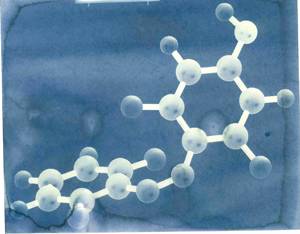Cyanotype collaboration leads to new teaching module at Texas State
By Colin Ashby
University News Service
July 29, 2013
|
Cyanotype Azobenzene |
A collaborative effort between a Texas State University photographer and the Department of Chemistry and Biochemistry involving cyanotype printing has been incorporated into a new teaching module that will be used in general education courses.
Cyanotype is known for giving a blue tint to photographs. It is an alternative, non-silver printing method. It is not widely used compared to other photographic techniques. Traditional photographic prints use light-sensitive silver halide to create a picture. Cyanotype uses iron salts that react to sunlight. Cyanotype processing was first used by botanists to catalog flora and fauna. It has since evolved and is now used primarily as an artistic medium.
“Cyanotype [printing] is an excellent demonstration of photochemistry and can be used as a demonstration of chemistry, specifically the interaction of light with chemicals,” William Brittain, chair for the Department of Chemistry and Biochemistry, said.
Chandler Prude, university photographer, was interested in using cyanotype printing for a possible branding campaign. Prude wanted to use cyanotypes because of the particular mood they offer to an image. Prude approached Brittain about a possible collaboration. Brittain, whose research focus is color-changing chemistry, took interest.
Brittain is now incorporating cyanotype printing into the Chemistry 1430 (Chemistry for Non-Science Majors) general education course that he will teach for the upcoming fall 2013 semester.
The cyanotype printing being incorporated into a general education course is part of the Partnerships for Research and Education in Materials (PREM) center’s mission in creating interest in students about careers in science, technology, engineering and math (STEM).
For more information on cyanotype printing or the chemistry class being taught for the fall 2013 semester, please contact William Brittain at (512) 245-3308.
